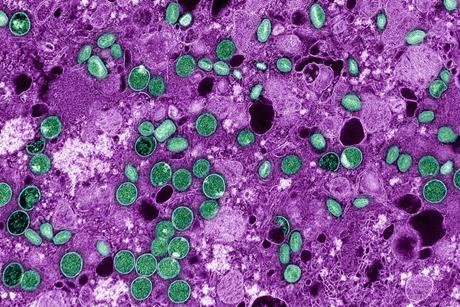Latest news
Vaccinated patients hospitalized with COVID-linked acute kidney injury less likely to need dialysis after discharge
Vaccinated patients hospitalized with COVID-19 who developed acute kidney injury had better outcomes than unvaccinated patients with the same condition, new research suggests. The study found vaccinated patients were less likely to stay on dialysis after discharge, and more likely to survive, than unvaccinated patients.
When bacteria get hungry, they kill – and eat – their neighbors
Scientists have discovered a gruesome microbial survival strategy: when food is scarce, some bacteria kill and consume their neighbors. The researchers show that under nutrient-limited conditions, bacteria use a specialized weapon — the Type VI Secretion System (T6SS) — to attack, kill, and slowly absorb nutrients from other bacterial cells.
Ribosome profiling identifies thousands of new viral protein-coding sequences
With the help of a technique called Massively Parallel Ribosome Profiling (MPRP), scientists have identified more than 4000 open reading frames (ORFs) across 679 human-associated viral genomes.
An oral cholera vaccination campaign aims to reach more than 2.6 million people in Sudan’s Khartoum State
A 10-day reactive oral cholera vaccination campaign, launched on 10 June in 5 localities in Sudan’s Khartoum State, aims to protect more than 2.6 million people aged 1 year and above from cholera infection, interrupt transmission and help contain the cholera outbreak.
2 million Americans with hepatitis C at risk if Supreme Court cancels free preventative care, study finds
A ruling overturning the Affordable Care Act (ACA) coverage mandate has the potential to dramatically change the landscape for early detection and treatment of hepatitis C virus in the U.S., according to a new paper.
A combination of exercise and omega-3 reduces the severity of tooth root infections
Rats that exercised and took fatty acid supplements responded better to bacteria and the inflammatory process of apical periodontitis, which can occur when caries reach the root canal and cause an infection.
Vaccinated patients hospitalized with COVID-linked acute kidney injury less likely to need dialysis after discharge
Vaccinated patients hospitalized with COVID-19 who developed acute kidney injury had better outcomes than unvaccinated patients with the same condition, new research suggests. The study found vaccinated patients were less likely to stay on dialysis after discharge, and more likely to survive, than unvaccinated patients.
When bacteria get hungry, they kill – and eat – their neighbors
Scientists have discovered a gruesome microbial survival strategy: when food is scarce, some bacteria kill and consume their neighbors. The researchers show that under nutrient-limited conditions, bacteria use a specialized weapon — the Type VI Secretion System (T6SS) — to attack, kill, and slowly absorb nutrients from other bacterial cells.
Ribosome profiling identifies thousands of new viral protein-coding sequences
With the help of a technique called Massively Parallel Ribosome Profiling (MPRP), scientists have identified more than 4000 open reading frames (ORFs) across 679 human-associated viral genomes.
Smart plastics are key to curbing healthcare infection rates, says Symphony Environmental
A leading plastics innovator urges hospitals and care-homes to adopt antimicrobial smart plastic solutions to address infection rates.
Transatlantic collaboration to develop therapeutic for Crimean-Congo Hemorrhagic Fever
A new transatlantic collaboration will look to develop an affordable and accessible monoclonal antibody therapeutic for Crimean-Congo Hemorrhagic Fever Virus (CCHFV), which could treat and protect thousands of people globally.
Instant AI-assisted test for viral infection
A non-DNA based test could identify viral infections in patients in minutes. Scientists designed a test that confirms the presence of live virus by pushing particles through a nanopore, one at a time, and measuring their electrical conductivity, which varies with size and surface charge as well as the unique molecular structure of the virus.
Drone-based tech deployed to detect subtle signs of rice blast disease
Scientists have developed a novel vegetation index—the Rice Blast Index (RBI)—using drone-based hyperspectral remote sensing technology, to rapidly and non-invasively detect subtle signs of rice blast disease and achieve precise field management.
Ultra-selective aptamers give viruses a taste of their own medicine
Inspired by the way viruses attach to cells, scientists have developed a method for engineering ultra-selective aptamers. The synthetic molecules bind to targets like viral spike proteins, making them useful for biomedical diagnostics and treatments.
An oral cholera vaccination campaign aims to reach more than 2.6 million people in Sudan’s Khartoum State
A 10-day reactive oral cholera vaccination campaign, launched on 10 June in 5 localities in Sudan’s Khartoum State, aims to protect more than 2.6 million people aged 1 year and above from cholera infection, interrupt transmission and help contain the cholera outbreak.
SHEA affirms trust in ACIP and supports science-based vaccine policy
Public health experts have commented on the removal by the US Department of Health and Human Services (HHS) of all 17 members of the Advisory Committee on Immunization Practices (ACIP), which advises the Centers for Disease Control and Prevention (CDC) on the use of vaccines in the US.
WHO announces that mpox remains a public health emergency of international concern
WHO Director-General Dr Tedros Adhanom Ghebreyesus has announced that the mpox upsurge continues to meet the criteria of a public health emergency of international concern (PHEIC) set forth in the International Health Regulations (IHR).

















